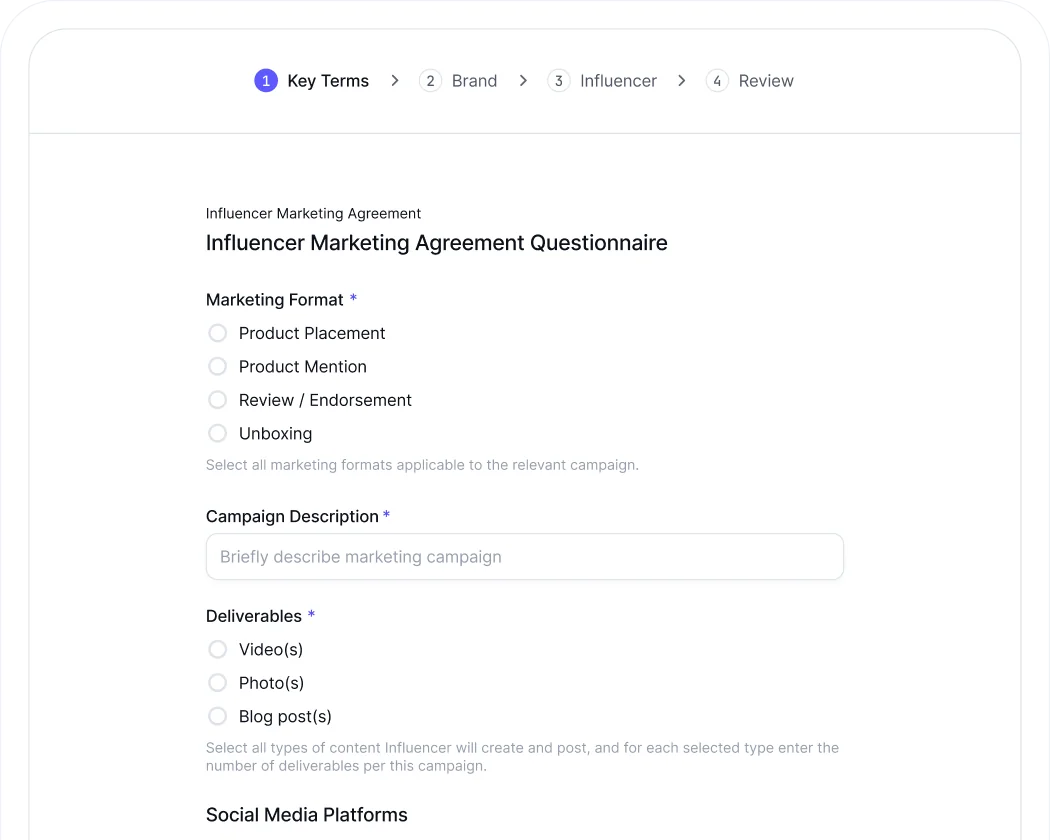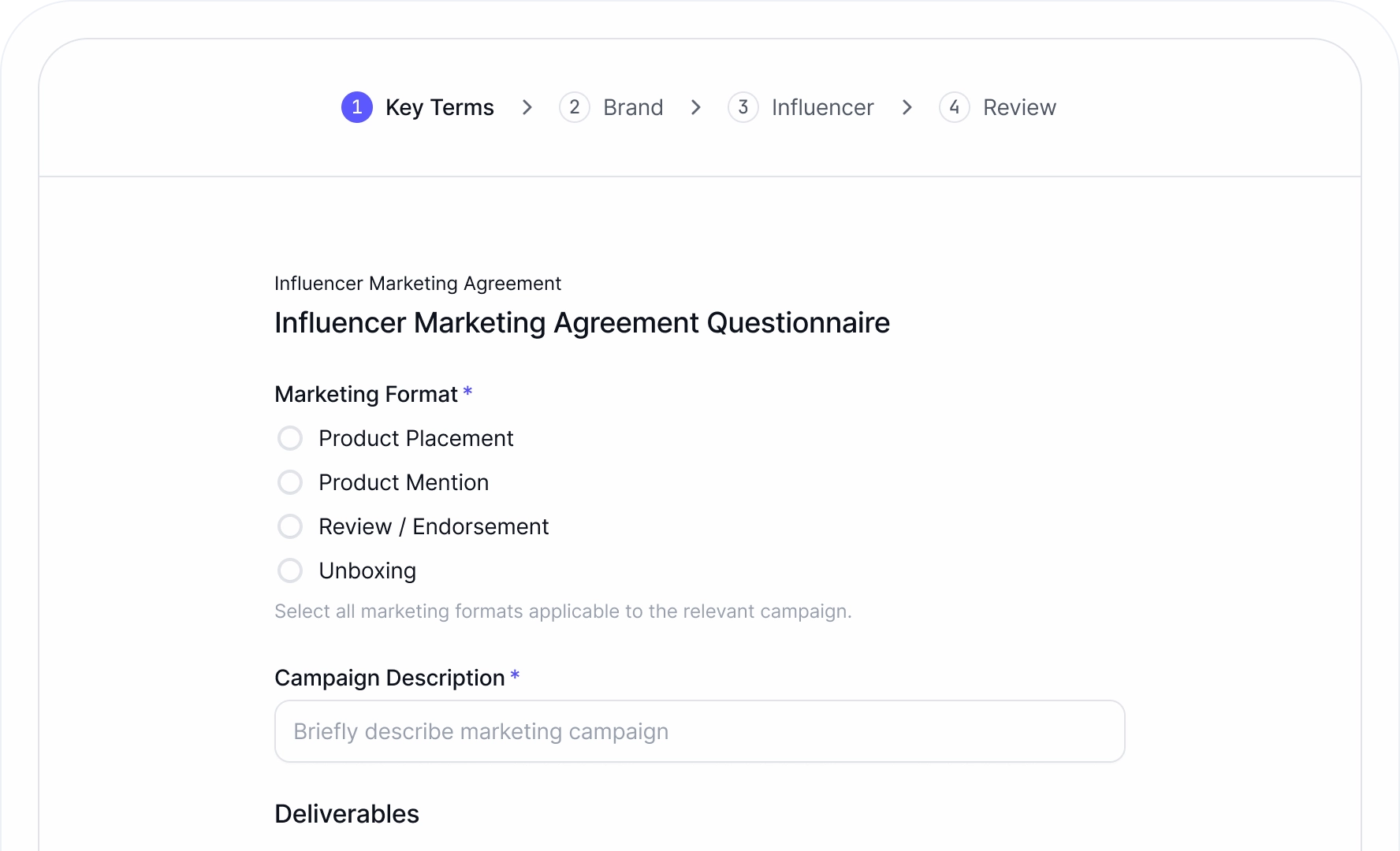Influencer Marketing Agreement
About Influencer Marketing Agreement
An influencer marketing agreement sets out the rules of collaboration between a brand and an influencer — whether that influencer is a person, an AI-generated avatar, or a synthetic voice that lives entirely online. It defines what will be created, how it will be shared, who owns it, and how both sides are protected.
Influencer partnerships have evolved fast. Many campaigns now feature AI-generated content, synthetic voices, and virtual personas — but most templates haven’t caught up. That’s why we built one that does.
Skala’s influencer marketing agreement is built to help you:
Stay compliant with global advertising and FTC influencer disclosure rules
Protect intellectual property in AI-generated and human-created content
Define compensation, deliverables, and timelines clearly
Manage campaigns across platforms — from Instagram and TikTok to YouTube, X, and emerging social media
Use synthetic media and AI marketing tools responsibly
It’s written in clear, practical language so brands and creators can collaborate confidently without losing hours decoding legal terms.
What’s Inside
Like every Skala template, the Influencer Marketing Agreement walks you through key terms with built-in guidance:
Things to Consider
Built for Human and AI Influencers
This agreement works for everyone — from lifestyle creators and YouTubers to AI-generated influencers, avatars, and voice models. It clearly defines how AI tools can be used, who owns the results, and how disclosure rules apply to synthetic content.
Ownership and Usage Rights
Creators keep ownership of their content, while brands receive a broad, perpetual license to use it across platforms, campaigns, and media formats. That includes synthetic media created using AI tools — ensuring everyone’s rights are protected.
Transparency and Compliance
Built to meet FTC guidelines and platform disclosure policies, the agreement requires clear, visible tagging when AI tools are used — such as “#Ad,” “#Sponsored,” or “AI-generated content.” This keeps your campaigns compliant and trustworthy.
Legal Compliance for Synthetic Media
The template includes synthetic media disclosure and consent requirements to prevent misuse of digital likenesses or voice models, protecting both creators and brands under evolving AI laws in the U.S. and abroad.
Independent Work Relationship
The influencer remains an independent creator, not an employee. That means full creative control and responsibility for their own tools, taxes, and instruments used.
Confidentiality and Data Use
Any information shared by the brand must stay protected — including data used to train AI systems or generate campaign material.
Easy Termination and Renewal Options
Either party can end the agreement with notice. Key terms — like licensing, confidentiality, and indemnity — remain in force to protect both sides even after termination.
Resolving Disputes
Choose between litigation or arbitration in key jurisdictions such as New York, California, the UK, Singapore, the UAE, or any other jurisdiction of your choice, depending on your campaign’s reach.
Why It Matters
Influencer campaigns are evolving beyond human creators. Virtual influencers, AI-generated videos, and voiceover ads are becoming mainstream. Brands need agreements that reflect this shift — covering not only compensation and content rights, but also AI disclosure, IP ownership, and synthetic media ethics.
Skala’s Influencer Marketing Agreement gives you everything you need to protect your brand, your creator relationships, and your compliance in one simple, flexible document.
One document. Infinite creativity — human or AI.
FAQ
The exercise price of the shares under the FAST agreement will be determined at the time of issuance and will be included in the applicable Stock Purchase Agreement.
-
-
-
-
-
FAQ
The template supports one-time fees, monthly fees, hourly rates, or a mix. Spell out the amount, timing, and any reimbursable expenses in the Key Terms and Payment section.
The influencer keeps ownership, while the brand receives a non-exclusive, worldwide, royalty-free, sublicensable license to use the content in all media for marketing and promotion. Unless changed in the Key Terms, this license is perpetual and irrevocable.
Yes. The brand gets a reasonable opportunity to review deliverables and request changes to ensure they meet brand guidelines and the agreement.
For at least the Minimum Post Availability Period set in the Key Terms. During that time, the influencer can’t delete or materially alter sponsored content without the brand’s written approval.
It’s optional. The parties can set an Exclusivity Period (e.g., no competing promotions for a defined time) or choose none.
















